Apple Intelligence inches closer to Apple's 1987 Knowledge Navigator
Controversial Apple CEO John Sculley may yet be proven right in his predictions for the future. Apple Intelligence could be the last step toward his fictional Knowledge Navigator.
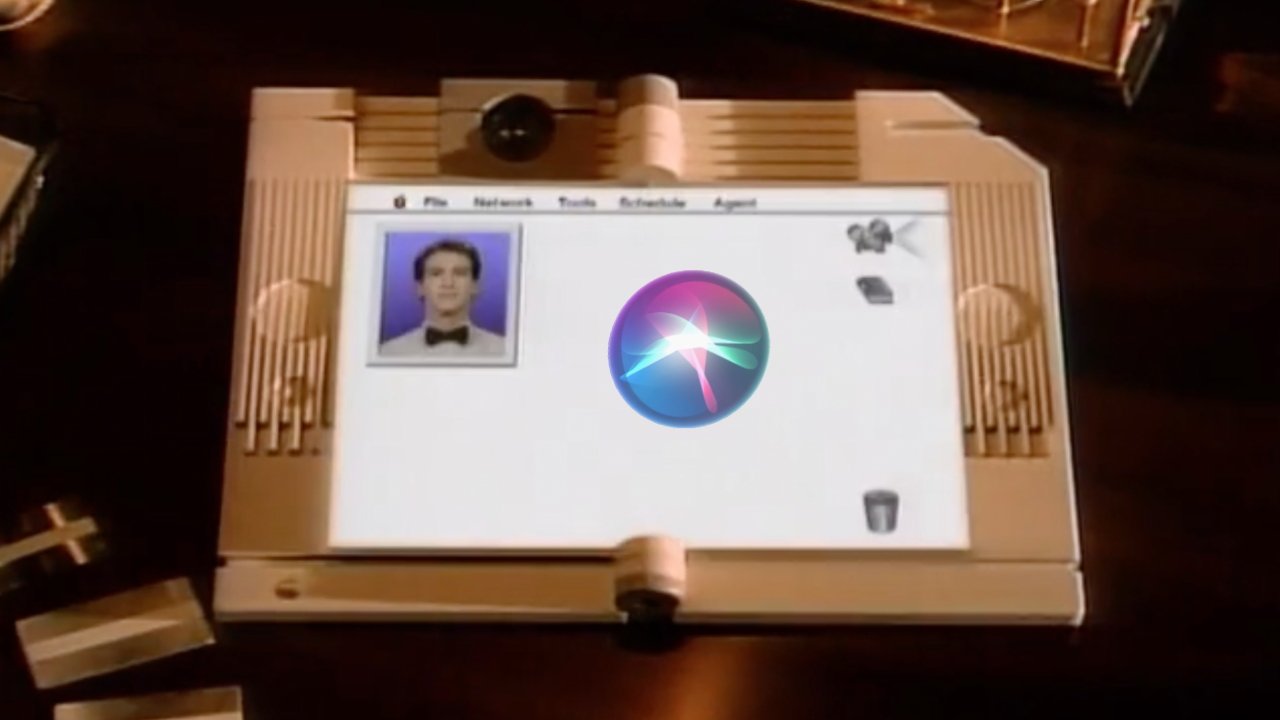
Apple's 1987 concept of the future, and Siri
Knowledge Navigator is a famous six-minute video created for John Sculley in 1987, and depicting life in what was meant to be the far future of around 2011. Sculley may be known first for ousting Steve Jobs, and perhaps for instigating the Newton MessagePad, but after that, it's his Knowledge Navigator video that he's remembered for.
To be harsh, it was Sculley attempting to be seen as a visionary for the future. To be generous, he got a huge amount right -- or at least, his team did.
Almost 40 years after Hugh Dubberly was hired to create a video and Sculley chose a science-fiction theme, Apple Intelligence is arguably about to seal the deal on making 1987's fiction into 2024's fact.
It's actually arguable just what precisely the video shows, but there are several distinct ideas that can be seen -- and that can be compared to today. They range from the hardware being shown, to the kinds of work that the lead character and most particularly his digital assistant are doing.
Fictional versus real hardware
Nothing tells you the Knowledge Navigator video is from the 1980s than the absolutely ugly hardware shown in it. There are traces of Apple's then-popular Snow White design ethos, but it's an adequate screen surrounded by an impossibly huge plastic monstrosity.

Apple Knowledge Navigator in all its plastic glory
Although to give the video credit, the Knowledge Navigator comes with a kind of stand to prop it up. But Apple had clearly not begun its obsession with thin bezels.
Plus the Knowledge Navigator is definitely an early iPad -- except that it's a folding one. There's no keyboard, though, and it has a front-facing camera for video calls, plus wireless networking.
- iPad-like device: Yes
- Folding iPad: No, but patents exist
- Lack of keyboard: Yes
- Front-facing camera for video calls: Yes
- Wireless networking: Yes
Today's devices score: 4 out of 5
Knowledge Navigator Assistant versus Siri
In 1987's view of the future, we would always have a digital assistant on our screens. He'd look like a college student with a bow tie, and he'd be a true, unpaid intern.
The key thing, though, is that he would look like this -- we would see him. All the time. During a video call in the video, his face is frozen but he's still looking at you.
Criticize Siri all you like, she does not stare you down. What Siri and the college student do both do, though, is extensive.
On other things, Siri is so close that you have to suspect it will get there when Apple Intelligence arrives. For instance, you can ask Knowledge Navigator to show you a specific document, and so far good luck getting Siri to do that.
That one about performing broad searches online is also true today, but will get closer soon. In the video, the professor character bossing around his digital assistant is able to get it to search for an online article when he can't remember what it's called.
Then once the assistant has found it and the professor has confirmed it's what he wants, the character is able to ask follow-up questions about the contents of the article. He doesn't have to re-state what article he means, because Knowledge Navigator understands he's referring to the same one.
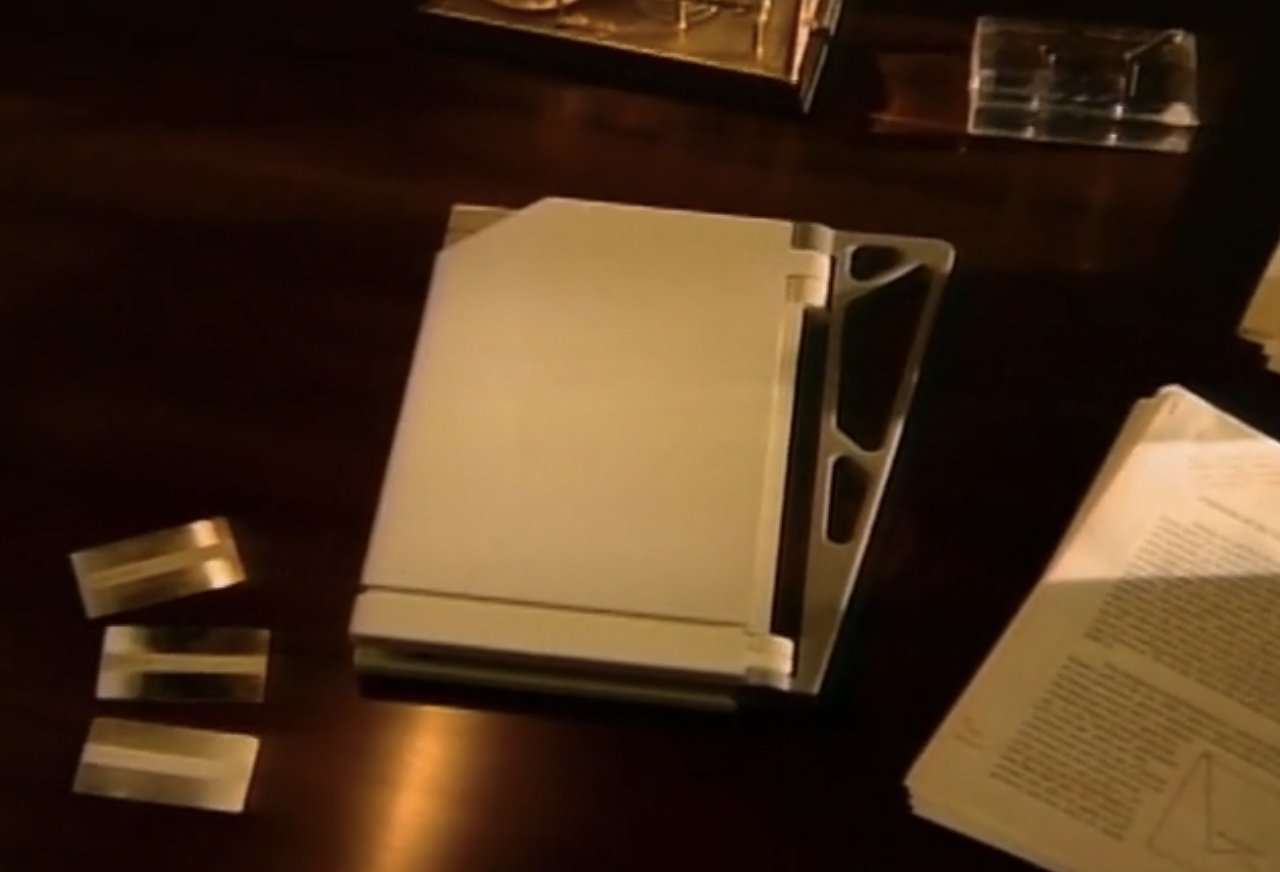
John Sculley's team even predicted the kickstand, sort of.
That's something Apple has said Apple Intelligence will bring us. Although this more conversational kind of communication with a digital assistant has been promised before.
Knowledge Navigator and Siri in action
The professor is able to tell his iPad -- sorry, his Knowledge Navigator -- to phone someone. We can do that now on iPads, and iPhones, and Mac.
What we can't do is determine that she's not available as quickly as the Navigator does. We'd have to wait for a busy signal, Navigator can just instantly tell us she's not responding to hails.
In the absence of talking to someone, the professor in the video then finally does some actual work. He asks for a map of all the universities -- and we can do that right now by typing "universities" into Apple Maps.
We can't ask Siri to find them, no more than we can then ask it to narrow down the search to just ones with a geography department. There are AI tools now that can do this or something like it, but they're not on the iPad.
There are perhaps also AI tools that could do what our lazy professor then tells his Knowledge Assistant to work on. "Copy the last 30 years at this location at one-month intervals," he says after looking at some data, and before he pops in a miniature floppy disk.
- Read aloud text messages and emails: Yes
- Read aloud your schedule for the day: Yes
- Search for articles online: Yes
- Summarize articles: no (but coming with Apple Intelligence)
- Perform broad web searches: Yes
Today's devices score: 4 out of 5
The past's view of collaboration
During all this, the woman he tried to phone earlier calls back and the Knowledge Navigator keeps her waiting. It does then announce that she's on the line, and Siri can announce phone calls too.
This all then becomes a very modern Zoom-like video call, if Zoom were limited to the small QuickTime Video player of the 1980s. Certainly the professor and his caller are able to share screens.
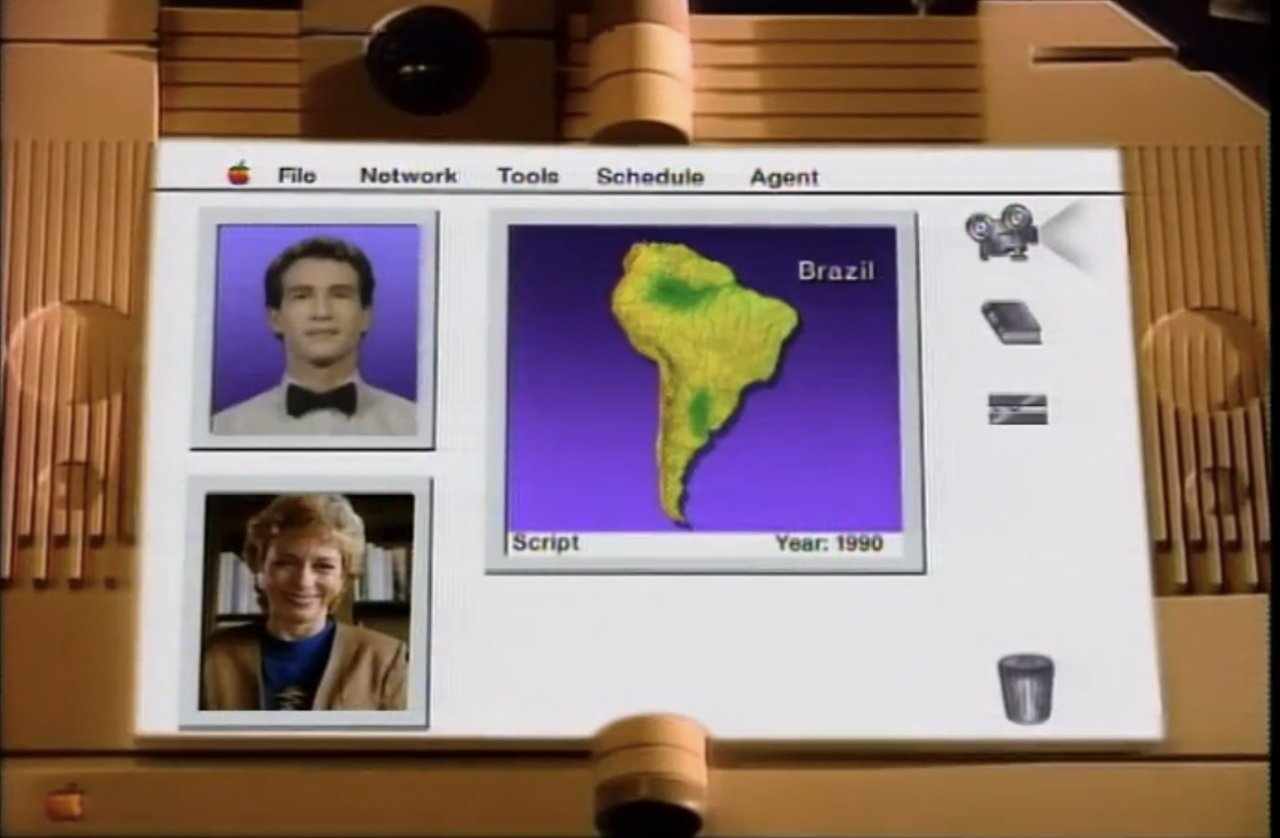
Video conferencing with Knowledge Navigator: which is the real collaborator and which the frozen digital assistant?
And while it's not clear, it does look as if the professor drags a window around. He does definitely draw on the screen, although without an Apple Pencil.
The two collaborators then work on charts that they, or Knowledge Navigator update. Maybe we could do that with AI image tools, just asking Siri to give us a chart with these figures instead of those.
That seems close to what Math Notes can do in iPadOS 18, but not quite. And this is an area we're not yet able to go as easily as the video shows us.
- Announce calls: Yes
- Video conferencing: Yes
- Screen sharing: Yes
- Drawing on screen: Yes
- Drag windows by hand: Yes
- Update charts by voice command: No
Today's devices score: 5 out of 6
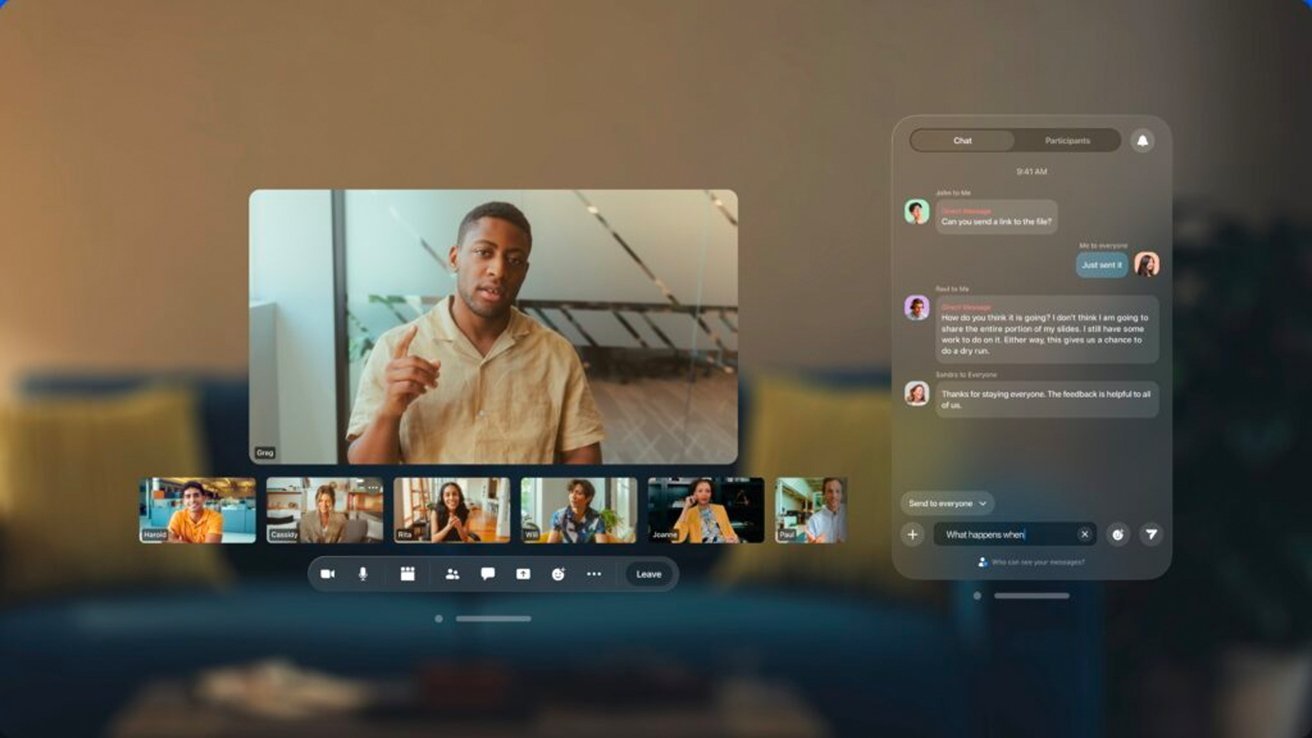
Knowledge Navigator didn't come close to video conferencing on Apple Vision Pro (Source: Zoom)
So much of this can be debated, but as a very rough guide, today's Siri software and iPad hardware match the Knowledge Navigator on a total of 13 out of 16 details.
Today's hardware does also exceed the Knowledge Navigator, though, and not least with how Shazam can identify the video's classical music soundtrack. (It's apparently the 1979 recording of Koncert C-dur: 1 Mezzo allegro by Josef Hala.)
That music is a scene-setting tune for the video, it isn't playing in the scene, it isn't being played by the Knowledge Navigator. Whereas today we can call out to the empty air to ask to hear practically any music we want.
True, asking Siri to play that Josef Hala track on Apple Music fails, but that may be down to rights issues in different territories. Today 1987 seems such a simpler time.
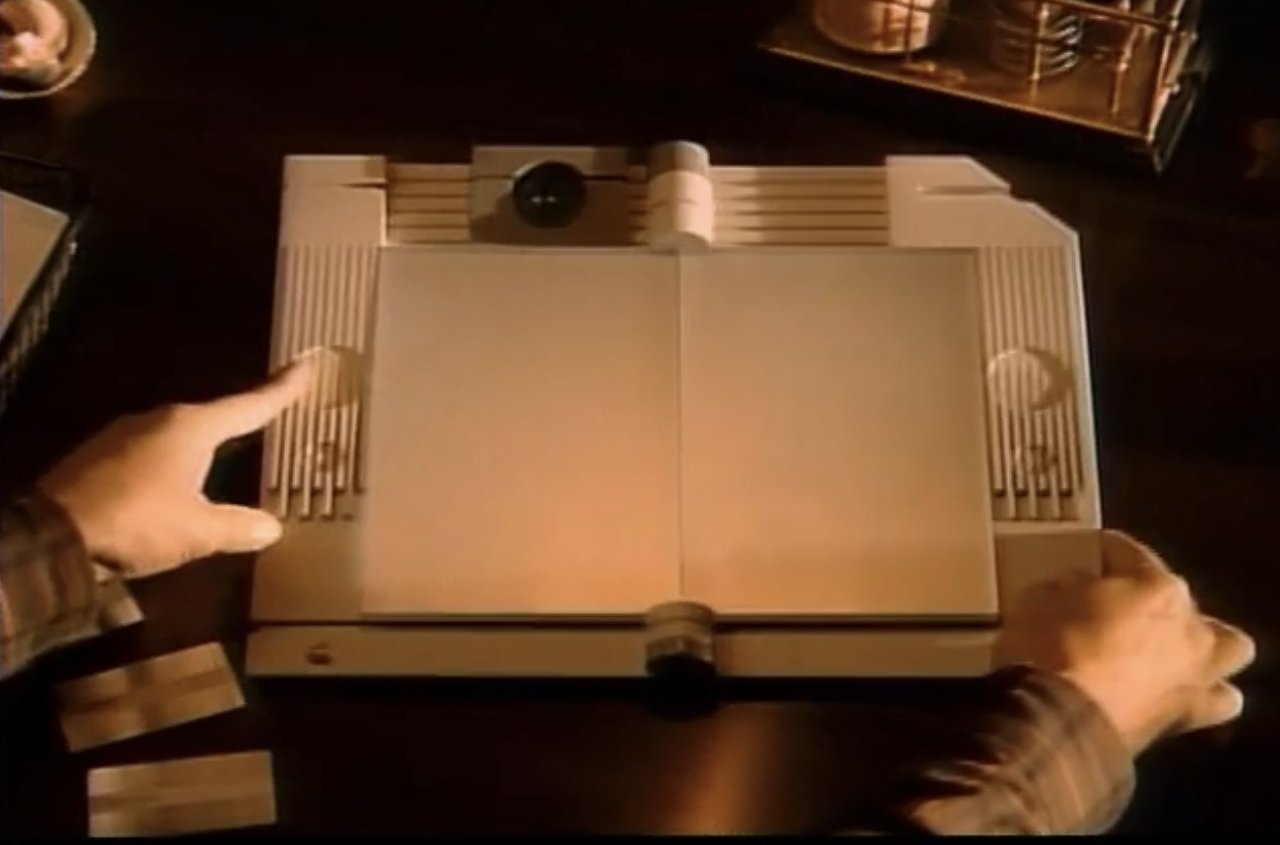
The opened-up Knowledge Navigator. Admire those bezels.
We're not quite living in Knowledge Navigator's world
In each of those examples, present-day Siri is only a hair behind the 1987 prediction of the future. That's quite startling, and video maker Dubberly plus advisors like Apple's Alan Kay, deserve a lot of credit.
There is one more thing, though. It's startling how boring the whole Knowledge Navigator video is.
Maybe that's because so very much of what it shows is now commonplace. But the characters are a bit dull, the lifestyle shown is a bit stuffy, and the interactions with the staring assistant don't make you want to rush to talk to Siri.
There is also this. As he's leaving for lunch, after his hard four to six minutes of work, the professor calls out to his digital assistant. He wants that assistant to "find out if I can set up a meeting tomorrow morning with Tom."
The point is to do that while the professor is away, and presumably tell him the answer when he's back. Today you can ask Siri to ask this Tom if he's free, but it will send the fella a text message.
And in corporations, Microsoft Outlook can search through all the calendars of everyone wanted for a meeting, and find the one time they can all make.
But it can't decide to that while you're on a coffee break. Siri so far does not work for you while you're away.
Maybe that's the last thing left before Sculley can truly claim that (the people he hired) were right.
Read on AppleInsider

Comments
One thing they missed, the Knowledge Navigator is made to sit on your desk the whole time, whereas the iPhone (and iPad) are made to take with you. A more modern imagining of this might show you walking in the city, hopping on and off a subway car, while doing all of what he's doing. I think that's the big difference when you look back at how people depicted future technology (not counting the fact that a stationary device was easier special effect), is they imagined it being an appliance in a room, that was used while you were there. While, today, we think of most technology as something that's with you anywhere you are, in any situation you need to be in.
We showed this video to big customers and at our yearly internal meetings. I kept a copy on VHS tape for years after I left the company. And I remember our leadership at the time saying they were working on everything seen in the video "except for the folding screen. That's science fiction". Turns out that wasn't science fiction after all.
The Knowledge Navigator shown is very much in the design aesthetic of the day if you look at upcoming Mac models like the SE, SE/30 and the Mac II. LCD screens were on the horizon with the Apple Portable and color would come a few years later in 1992 with the Powerbook 180c. These days design is much thinner and elements like a front facing camera are huge versus modern ones. There might have been a decision to make it larger for the video just so everyone would know what people were looking at. And while video conferencing was being proposed and demoed by companies like AT&T since the 1960s, using it in a Zoom-like call alongside your computer GUI desktop was a new thing as opposed to using a standalone device.
The KN was a touch screen interface predating the iPad by 23 years (although unlike the iPad, it had a Mac interface). You have no idea how cool this was to see visualized back then. Star Trek: TNG would use something similar when that show premiered in the same timeframe.
Other technology elements were pretty out there but turned out to be spot on. Apple would introduce Wifi to the world built into a Mac in 1999 (iBook). There were rudimentary search tools like Gopher on the then-Arpanet (the true open Internet was not a thing in 1987) but true powerful search engines like Altavista and later Google would be years later. The ability to have multiple people work on a common document is pretty routine these days but back then, it was fantasy but Apple would introduce its first version of that idea as OpenDoc.
And now we come to the Chatbot agent itself, the guy with the bowtie. This seemed the most "sci-fi" of all back then but we were told at the time that scientists were working on it. But as we know with Apple, hard times would befall them in coming years and many of the long term research projects fell by the wayside as unaffordable luxuries. But we're pretty close to that personalized agent as part of our devices. Context and intent are fast approaching what was shown in the video, along with knowing personal details like the professor's mother, his friends and colleagues, personal schedule, all his files, and even listening in and (hilariously) interjecting in a conversation. All this time since the iPad was introduced and later Siri and its (better) chat agent cousins, I've wondered how long it would take us to get to Knowledge Navigator. It looks like we won't have to wait that much longer.
Implementation is what is valuable. Ideas easy, implementation hard. See Humane pin.
Lets not give Sculley any credit for this.
The Knowledge Navigator, on the other hand, was a near-future extrapolation by Alan Kay and others saying, "You know what? I think we can actually do this."
I'd love to have a high-definition version of that video.
I think you forgot one point: The 1987's video spoke of ‘forest raind‘… and in 2024 we are dealing with a huge climate change problem!
On the other side… to find the music of the video… maybe you must try Classical Music!
I think in some ways Siri is an improvement.
It's highly probable that Apple as a company and brand would have ceased to exist very soon after a second Steve Jobs firing.
https://www.cultofmac.com/445723/today-in-apple-history-steve-jobs-leaves-and-rejoins-apple/#:~:text=The%20%24400%20million%20sale%20of,help%20Apple%20locate%20new%20leadership.
I haven't a clue where you get your hatred for Steve Jobs, especially after he took on the role of temporary CEO in 1996, and you obviously have issues with Apple's current leadership. Says more about you than it does about Apple.
Perhaps you should start you own mobile phone company; I hear that MS is looking to reenter the market...